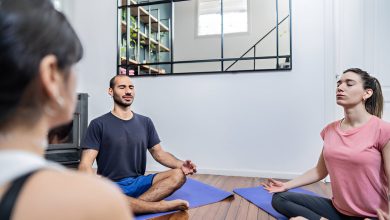The Power of Breath: Embracing a Breathing Meditation Program

In today’s fast-paced world, stress and anxiety have become common companions for many. Finding ways to cope and achieve mental clarity is essential. One powerful and accessible method is breathing meditation. This ancient practice is simple, effective, and can be done anywhere. Here, we explore what a breathing meditation program entails, its benefits, and how to get started.
What is Breathing Meditation?
Breathing meditation is a form of mindfulness practice that involves focusing on the breath to anchor the mind in the present moment. It is one of the most basic yet profound forms of meditation. By paying attention to your breath, you can calm the mind, reduce stress, and enhance overall well-being.
Benefits of a Breathing Meditation Program
- Reduces Stress and Anxiety: Focusing on your breath helps activate the body’s relaxation response, lowering levels of the stress hormone cortisol and calming the nervous system.
- Improves Concentration and Focus: Regular practice enhances your ability to concentrate and stay focused on tasks, improving productivity and efficiency.
- Enhances Emotional Regulation: Breathing meditation promotes greater awareness of your thoughts and emotions, allowing you to respond to situations more calmly and rationally.
- Promotes Physical Health: Deep, mindful breathing increases oxygen intake, improves circulation, and can help lower blood pressure. It also supports better digestion and sleep.
- Boosts Mental Clarity: By clearing the mind of distractions, breathing meditation can lead to improved mental clarity and creativity.
Components of a Breathing Meditation Program
A well-structured breathing meditation program typically includes the following components:
- Guided Sessions: Especially useful for beginners, guided sessions involve following the instructions of a meditation teacher or a recording. These sessions help you learn proper techniques and stay focused.
- Self-Practice Sessions: Once you’re comfortable with guided sessions, you can incorporate self-practice. This involves setting aside time each day to meditate on your own, focusing solely on your breath.
- Breathing Techniques: Various breathing techniques can be practiced, such as diaphragmatic breathing, box breathing, and alternate nostril breathing. Each technique has its unique benefits and can be integrated into the program.
- Mindfulness Training: Alongside breathing exercises, mindfulness training helps cultivate an overall sense of presence and awareness in everyday life.
- Regular Reflection: Keeping a journal or reflecting on your practice helps track progress, note any changes in stress levels, and stay motivated.
How to Get Started
- Find a Quiet Space: Choose a quiet, comfortable place where you won’t be disturbed. This could be a dedicated meditation space in your home, a quiet room, or even a peaceful outdoor spot.
- Set a Time Limit: Start with short sessions, such as 5-10 minutes, and gradually increase the duration as you become more comfortable with the practice.
- Get Comfortable: Sit or lie down in a comfortable position. Ensure your posture is relaxed yet alert, with your back straight and shoulders relaxed.
- Focus on Your Breath: Close your eyes and take a few deep breaths. Then, allow your breath to settle into its natural rhythm. Focus your attention on the sensation of the breath entering and leaving your nostrils, or the rise and fall of your chest or abdomen.
- Observe Without Judgment: As you meditate, thoughts will inevitably arise. Rather than getting frustrated or trying to suppress them, gently acknowledge them and bring your focus back to your breath.
- Practice Regularly: Consistency is key. Try to meditate at the same time every day to build a routine. Even a few minutes a day can make a significant difference over time.
Conclusion
A breathing meditation program is a simple yet powerful way to manage stress, enhance mental clarity, and improve overall well-being. By dedicating a small portion of your day to focus on your breath, you can cultivate a sense of inner peace and resilience that permeates all aspects of your life. Whether you’re a beginner or an experienced meditator, incorporating breathing meditation into your daily routine can lead to lasting benefits for your mind, body, and spirit.


